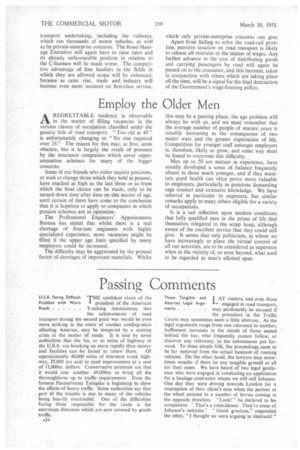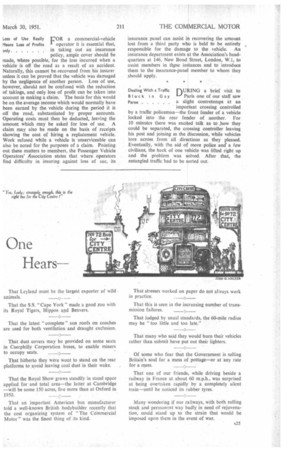Passing Comments
Page 26

Page 27

If you've noticed an error in this article please click here to report it so we can fix it.
U.S.A. Facing Difficult THE confident claim of the Problem with Worn I president of the American Roads Trucking Associations, that
the achievements of •road transport during the second great war would be even more striking in the event of another conflagration affecting America, may be tempered by a coming crisis in the matter of roads. It is said by some authorities that the 3m. or so miles of highway in the USA. are breaking up more rapidly than money and facilities can -be found to renew them. Of approximately 40,000 miles of interstate trunk highway, 35,000 are said to need improvement at a cost of 11,000m. dollars. Conservative estimates are that it would cost another 49,000m. to bring all the thoroughfares up to traffic requirements. Even the famous Pennsylvania Turnpike is beginning to show the effects of heavy traffic. Some authorities say that part of the trouble is due to many of the vehicles being heavily overloaded. One of the difficulties facing those responsible for the roads is the enormous distances which are now covered by goods traffic.
A24
Those Tangible and I AY visitors, and even those Abstract Legal Argu1--• engaged in road transport, ments may pardonably be excused if the procedure in the Traffic Courts may sometimes seem a little abstruse. As the legal arguments range from one reference to another, bafflement increases in the minds of those seated behind the bar, who frequently cannot follow, or discover any relevancy, in the submissions put forward. To these simple folk, the proceedings seem to be far removed from the actual business of running vehicles. On the other hand, the lawyers may sometimes wonder if there be any tangible ground at all for their cases. We have heard of two legal gentlemen who were engaged.in conducting an application for a haulage contractor whom we will call Johnson. One day they were driving towards London for a resumption of their client's case when the partner at the wheel pointed to a number of lorries coming in the opposite direction. " Look!" he declared to his companion. That's a coincidence. They're some of Johnson's vehicles." "Good gracious," responded the other, " I thought we were arguing in abstracts!"
Loss of Use Really VOR a commercial-vehicle Means Loss of Profits I operator it is essential that,
5n1y in taking out an insurance
policy, ample cover should be made, where possible, for the loss incurred when a vehicle is off the road as a result of an accident. Naturally, this cannot he recovered from his insurer unless it can be proved that the vehicle was damaged by the negligence of another person. Loss of use, however, should not be confused with the reduction of takings, and only loss of profit can be taken into account in making a claim. The basis for this would he on the average income which would normally have been earned by the. vehicle during the period it is off the road, substantiated by proper accounts. Operating costs must then be deducted, leaving the amount which may be asked for loss of use. A claim may also be made on the basis of receipts showing the cost of hiring a replacement vehicle. Work refused while a vehicle is unserviceable can also be noted for the purposes of a claim. Pointing out these matters to members, the Passenger Vehicle Operators' Association states that where operators find difficulty in insuring against loss of use, its insurance panel can assist in recovering the amount lost from a third party who is held to be entirely responsible for the damage to the vehicle. An insurance department exists at the Association's headquarters at 146, New Bond Street, London, W.1, to assist members in th,ese instances and to introduce them to the insurance-panel member to whom they should apply.
Dealing With a Traffic DURING a brief visit to
Block in Gay Paris one of our staff saw
Paree a slight contretemps at an important crossing controlled by a traffic policeman—the front fender of a vehicle locked into the rear fender of another. For 10 minutes there was excited talk as to how they could be separated, the crossing controller leaving his post and joining in the discussion, while vehicles tore across from all directions as they pleased. Eventually, with the aid of more police and a few civilians, the back of one vehicle was lifted right up and the problem was solved. After that, the entangled traffic had to be sorted out.












































































